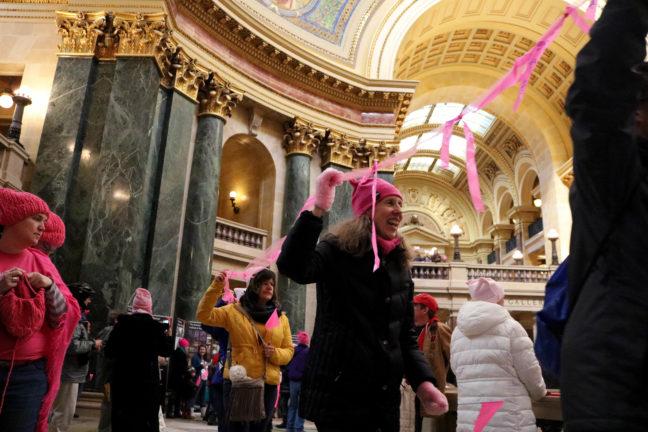As part of nationwide protests inspired by former presidential candidate U.S. Sen. Bernie Sanders, I-Vermont, Madisonians opposed repealing the Affordable Care Act by participating in a “Capitol Pink Out.”
While the event featured speakers, the common protest singalong song “Solidarity” and more, the main event was encircling the State Capitol Building Saturday afternoon with a 1,800-foot pink ribbon. Participants wrote their names on smaller ribbons and tied them to the main ribbon.
The Pink Out protest in Madison occurred shortly after House GOP leaders, including U.S. House Speaker Paul Ryan, R-Janesville, presented outlines of their plan to replace the ACA, according to The New York Times.
“There was a Planned Parenthood rally, a Pink Out, a couple weeks ago, and we loved that idea,” said Eric Guderyon, one of the organizers. “We loved the connection of the color pink with the Women’s March, so we wanted to take that and run with it.”
Guderyon said the reason for including the smaller personalized ribbons was to involve participants further and make them feel less alone. He said they designed the event to be fun to keep people from getting discouraged.
Johanna Coenen, one of the people assisting at the ribbon tables, said the identifying color is being used to tie in protester’s resistance efforts on multiple issues.
“Pink is going to show folks that we’re committed, together and we’re going to stay focused and engaged in resisting the Trump agenda,” said.
Members of the medical community spoke up at the protest, outlining potential consequences of repealing the ACA and describing the challenges they face when dealing with insurance companies.
Matt Guerrieri, a second-year medical student at the University of Wisconsin, said he frequently encounters stories of hardships with insurance even with only his limited experience working with patients.
“Every single day that I spend in clinic or talking to patients, I hear a story about how a person has struggled to get the care that they need because of a barrier with their insurance,” Guerrieri said.
Patients often either forgo needed medication when they temporarily lose insurance or don’t have insurance plans that cover the right medication, Guerrieri said. They may also receive surprise hospital bills and subsequently hesitate to return.
Guerrieri and other speakers opposed a “convoluted, complicated and expensive” private health insurance system, instead preferring a single-payer system.
“I haven’t even started my career as a physician, but I already see so many people right here in our community who are struggling to meet their health needs because of the insurance system,” Guerrieri said.
He said medical professionals are feeling the need to speak up on the issue because they see the devastating consequences of not having an adequate health care system every day, and they find it “draining” to constantly deal with these authorization barriers when trying to treat patients.
In Photos: Women’s March turns downtown Madison into a sea of pink
Rather than coming from a specific organization, the protest came together through the collaborative efforts of local individuals, said Truly Remarkable Loon, one of the organizers.
Loon said he was happy with the turnout and team effort, especially considering the protest was put together on short notice. He urged citizens to reach out to their representatives and let them know what they want from their health care system.
“We want health care for everybody,” Loon said. “It’s been given to everyone as a right … Our government’s job is not to take away rights. It’s to give us more.”
Police officers at the Capitol said the event went “very smoothly.”


